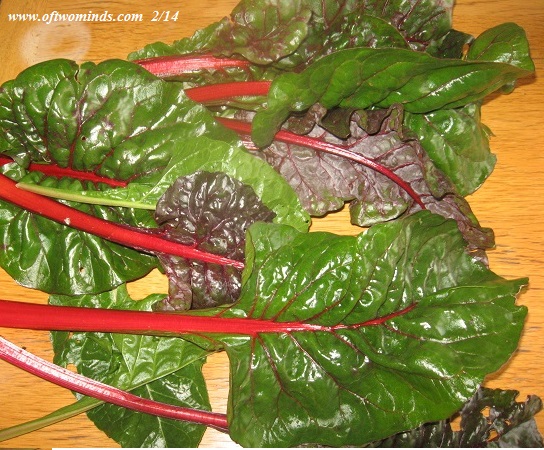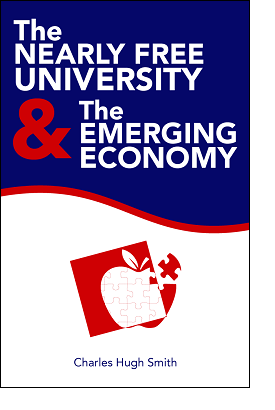| Online: | |
| Visits: | |
| Stories: |

| Story Views | |
| Now: | |
| Last Hour: | |
| Last 24 Hours: | |
| Total: | |
From the Garden to the Table in 20 Minutes
Though the the Status Quo is unsustainable, that doesn’t mean we are powerless to improve our own lives.
The great thing about a garden is that you can harvest vegetables and serve them for dinner a short time later. Winter gardens are not possible in many areas, but there are a few vegetables that are hardy enough to thrive in cold (but not freezing) temperatures, for example, chard and kale.
I am a very lazy gardener, so the kale and chard thrive on their own, with no help from me other than a bit of compost and weeding. These leafy veggies will continue to produce new leaves for months, so you can harvest a few leaves from each plant throughout the season. Here’s some red and green chard I picked a few days ago:
There are many ways to prepare kale and chard–for example, in soups–but one way is to steam a few leaves, squeeze the moisture out and fashion a roll that you slice and top with a drizzle of sesame oil and roasted sesame seeds. This produces a yummy Japanese-style side dish:
Though I often write about the systemic reasons the Status Quo is unsustainable, I also discuss what we can do as individuals and households. That includes having a garden, being frugal as a means of assembling capital ( The Only Leverage We Have Is Extreme Frugality December 27, 2013) and focusing on assets that cannot be devalued or expropriated: skills, social capital, trusted networks, small-scale enterprises you own and control, etc.
This philosophy finds expression in this selection of aphorisms:
“There is no security on this earth; there is only opportunity.” (Douglas MacArthur)
“We are what we repeatedly do.” (Aristotle)
“Do the thing and you shall have the power.” (Ralph Waldo Emerson)
“The man who has a garden and a library has everything.” (Cicero)
“A healthy homecooked family meal and a home garden are revolutionary acts.” (CHS)
The Nearly Free University and The Emerging Economy:
The Revolution in Higher Education
Reconnecting higher education, livelihoods and the economyWith the soaring cost of higher education, has the value a college degree been turned upside down? College tuition and fees are up 1000% since 1980. Half of all recent college graduates are jobless or underemployed, revealing a deep disconnect between higher education and the job market.
It is no surprise everyone is asking: Where is the return on investment? Is the assumption that higher education returns greater prosperity no longer true? And if this is the case, how does this impact you, your children and grandchildren?

We must thoroughly understand the twin revolutions now fundamentally changing our world: The true cost of higher education and an economy that seems to re-shape itself minute to minute.
The Nearly Free University and the Emerging Economy clearly describes the underlying dynamics at work – and, more importantly, lays out a new low-cost model for higher education: how digital technology is enabling a revolution in higher education that dramatically lowers costs while expanding the opportunities for students of all ages.
The Nearly Free University and the Emerging Economy provides clarity and optimism in a period of the greatest change our educational systems and society have seen, and offers everyone the tools needed to prosper in the Emerging Economy.
Things are falling apart–that is obvious. But why are they falling apart? The reasons are complex and global. Our economy and society have structural problems that cannot be solved by adding debt to debt. We are becoming poorer, not just from financial over-reach, but from fundamental forces that are not easy to identify. We will cover the five core reasons why things are falling apart:
 1. Debt and financialization
1. Debt and financialization
2. Crony capitalism
3. Diminishing returns
4. Centralization
5. Technological, financial and demographic changes in our economy
Complex systems weakened by diminishing returns collapse under their own weight and are replaced by systems that are simpler, faster and affordable. If we cling to the old ways, our system will disintegrate. If we want sustainable prosperity rather than collapse, we must embrace a new model that is Decentralized, Adaptive, Transparent and Accountable (DATA).
We are not powerless. Once we accept responsibility, we become powerful.
Read the Introduction/Table of ContentsKindle: $9.95 print: $24
| Thank you, James M. ($20), for yet another splendidly generous contribution to this site — I am greatly honored by your steadfast support and readership. | Thank you, Steve W. ($25), for your extremely generous contribution to this site — I am greatly honored by your support and readership. |
for the full posts and archives.
Source: http://charleshughsmith.blogspot.com/2014/02/from-garden-to-table-in-20-minutes.html



